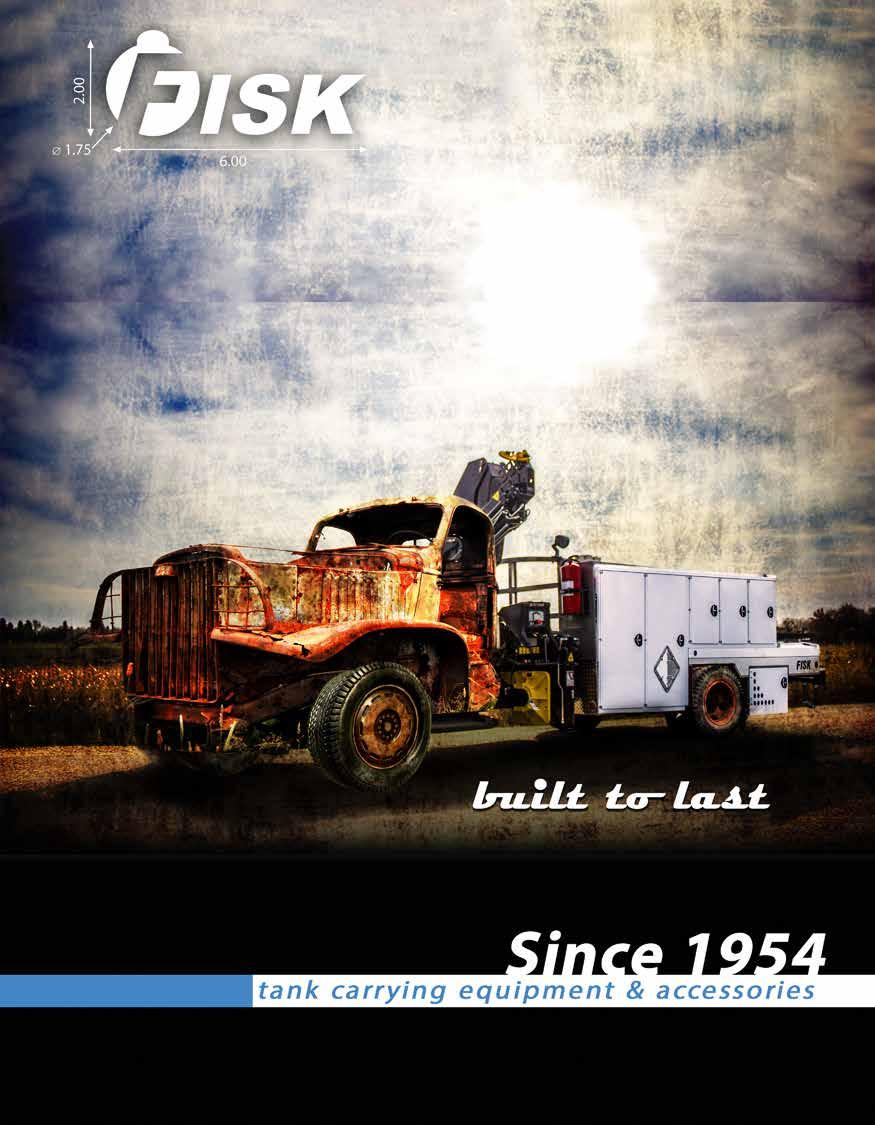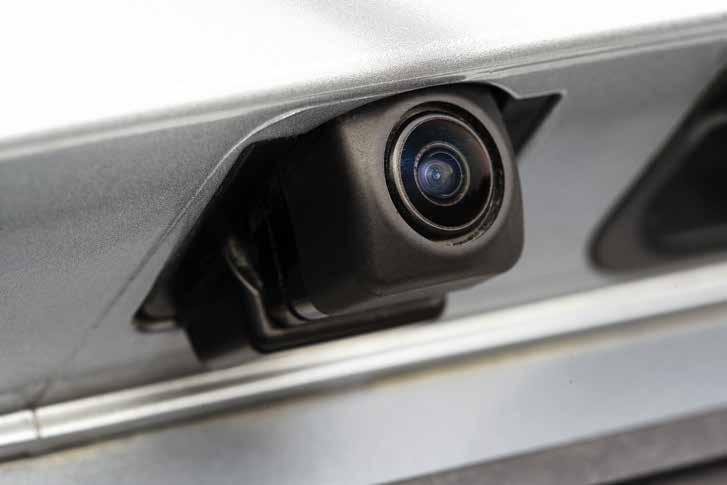
19 minute read
Protecting Your Company Data: Proper Disposal of Electronics
Why is it important to dispose of electronic devices safely?
In addition to effectively securing sensitive information on electronic devices, it is important to follow best practices for electronic device disposal. Computers, smartphones, and cameras allow you to keep a great deal of information at your fingertips, but when you dispose of, donate, or recycle a device you may inadvertently disclose sensitive information, which could be exploited by cyber criminals.
Advertisement
Types of electronic devices include:
Computers, smartphones, and tablets — electronic devices that can automatically store and process data; most contain a central processing unit and memory, and use an operating system that runs programs and applications; Digital media — these electronic devices create, store, and play digital content. Digital media devices include items like digital cameras and media players;
External hardware and peripheral devices — hardware devices that provide input and output for computers, such as printers, monitors, and external hard drives; these devices contain permanently stored digital characters; and Gaming consoles — electronic, digital, or computer devices that output a video signal or visual image to display a video game.
What are some effective methods for removing data from your device?
There are a variety of methods for permanently erasing data from your devices (also called sanitizing). Because methods of sanitization vary according to device, it is important to use the method that applies to that particular device.
Before sanitizing a device, consider backing up your data. Saving your data to another device or a second location (e.g., an external hard drive or the cloud) can help you recover your data if you accidently erase information you had not intended to or if your device is stolen (this can also help you identify exactly what information a thief may have been able to access). Options for digital storage include cloud data services, CDs, DVDs, and removable flash drives or removable hard drives (see Using Caution with USB Drives for more information).
Methods for sanitization include: Deleting data. Removing data from your device can be one method of sanitization. When you delete files from a device— although the files may appear to have been removed—data remains on the media even after a delete or format command is executed. Do not rely solely on the deletion method you routinely use, such as moving a file to the trash or recycle bin or selecting “delete” from the menu. Even if you empty
the trash, the deleted files are still on device and can be retrieved. Permanent data deletion requires several steps. Computers. Use a disk cleaning software designed to permanently remove the data stored on a computer hard drive to prevent the possibility of recovery. Secure erase. This is a set of commands in the firmware of most computer hard drives. If you select a program that runs the secure erase command set, it will erase the data by overwriting all areas of the hard drive. Disk wiping. This is a utility that erases sensitive information on hard drives and securely wipes flash drives and secure digital cards.
Smartphones and tablets. Ensure that all data is removed from your device by performing a “hard reset.” This will return the device to its original factory settings. Each device has a different hard reset procedure, but most smartphones and tablets can be reset through their settings. In addition, physically remove the memory card and the subscriber identity module card, if your device has one.
Digital cameras, media players, and gaming consoles. Perform a standard factory reset (i.e., a hard reset) and physically remove the hard drive or memory card. Office equipment (e.g., copiers, printers, fax machines, multifunction devices). Remove any memory cards from the equipment. Perform a full manufacture reset to restore the equipment to its factory default.
Overwriting. Another method of sanitization is to delete sensitive information and write new binary data over it. Using random data instead of easily identifiable patterns makes it harder for attackers to discover the original information underneath. Since data stored on a computer is written in binary code—strings of 0s and 1s—one method of overwriting is to zerofill a hard disk and select programs that use all zeros in the last layer. Users should overwrite the entire hard disk and add multiple layers of new data (three to seven passes of
new binary data) to prevent attackers from obtaining the original data.
Cipher.exe is a built-in command-line tool in Microsoft Windows operating systems that can be used to encrypt or decrypt data on New Technology File System drives. This tool also securely deletes data by overwriting it.
Clearing is a level of media sanitation that does not allow information to be retrieved by data, disk, or file recovery utilities. The National Institute of Standards and Technology (NIST) notes that devices must be resistant to keystroke recovery attempts from standard input devices (e.g., a keyboard or mouse) and from data scavenging tools. Destroying. Physical destruction of a device is the ultimate way to prevent others from retrieving your information. Specialized services are available that will disintegrate, burn, melt, or pulverize your computer drive and other devices. These sanitization methods are designed to completely destroy the media and are typically carried out at an outsourced metal destruction or licensed incineration facility. If you choose not to use a service, you can destroy your hard drive by driving nails or drilling holes into the device yourself. The remaining physical pieces of the drive must be small enough (at least 1/125 inches) that your information cannot be reconstructed from them. There are also hardware devices available that erase CDs and DVDs by destroying their surface.
Magnetic media degaussers. Degaussers expose devices to strong magnetic fields that remove the data that is magnetically stored on traditional magnetic media.
Solid-state destruction. The destruction of all data storage chip memory by crushing, shredding, or disintegration is called solid-state destruction. Solid-State Drives should be destroyed with devices that are specifically engineered for this purpose.
CD and DVD destruction. Many office and home paper shredders can shred CDs and DVDs (be sure to check that the shredder you are using can shred CDs and DVDs before attempting this method).
For more information, see the NIST Special Publication 800-88 Guidelines for Media Sanitization.
How can you safely dispose of out-of-date electronic devices?
Electronic waste (sometimes called e-waste) is a term used to describe electronics that are nearing the end of their useful life and are discarded, donated, or recycled. Although donating and recycling electronic devices conserves natural resources, you may still choose to dispose of e-waste by contacting your local landfill and requesting a designated e-waste drop off location. Be aware that although there are many options for disposal, it is your responsibility to ensure that the location chosen is reputable and certified. Visit the Environmental Protection Agency’s (EPA) Electronics Donation and Recycling webpage for additional information on donating and recycling electronics. For information on recycling regulations and facilities in your state, visit the EPA Regulations, Initiatives, and Research on Electronics Stewardship webpage.
This information was provided by The Cybersecurity and Infrastructure Security Agency (CISA). This article, plus other tips, can be found at us-cert.gov/ncas/tips.
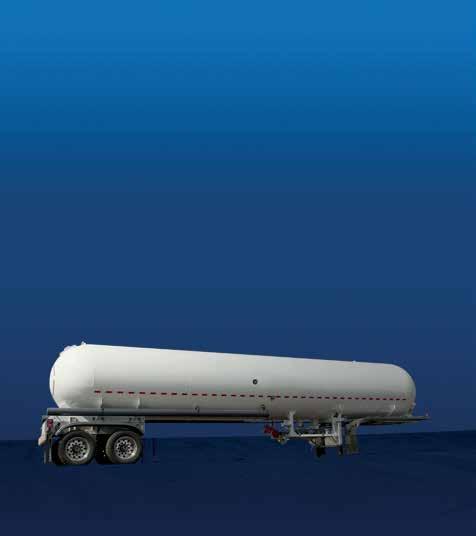
FURTHER GO
People in Propane
Rodolfo “Rudy” De La Garza, 65, passed away November 23, 2019 in Weslaco, Texas. Rudy had a dedicated devotion to God, loved life and would say his greatest legacy were his children and grandchildren. He retired from the Alternative Fuels Research & Education Division (AFRED) of the Railroad Commission of Texas in 2014, where he worked for 20 years as a marketing field representative for South Texas, as well as other roles within AFRED. Our thoughts and prayers go out to the family.
Rita Monette Mead passed away on December 17, 2019. In addition to working at their hearing aid service center and their propane company, Monette volunteered in many ways but mostly at her children’s schools, at the churches she attended, with the Marble Falls Soroptimists and with the Spicewood Volunteer Fire Department Ladies Auxiliary. Our thoughts and prayers go out to the family.
Retired Master Sgt. Clifford Dale Watson, 82, of Killeen, passed away on January 17, 2020. Mr. Watson was a devoted husband and father – whenever the Cowboys would play, the whole family would be watching and cheering them on. He taught his daughter to fish as well as archery; he would play games like Operation and was known to take over her Spirograph on occasion. He retired from the Army in 1987. He worked at Killeen Propane from 1987 to 2003 when the business sold. He was offered a job at Smith and Smith Propane and served as Hardware Propane Manager until his death. Our thoughts and prayers go out to the family at this time.
Glenn Steele Connor, 96, of Bryan, passed away on January 22, 2020. He was a loving husband, father, grandfather and great-grandfather. He was the owner and operator of Connor Shell Station located at 26th and Texas Ave in Bryan until he retired in 1978. He then began a second career with Cal-Gas and AmeriGas Propane companies. After retiring from his second career, he assisted his son with his business and worked well into his eighties and retired when his health declined. Our thoughts and prayers go out to the family at this time.
James A. “Jimmy” Urbanosky, 87, of Caldwell, TX, passed away on January 28, 2020. He was a 4th Degree Knights of Columbus member and played many roles in St. Mary’s Catholic Church, but most important was the bell ringer before mass. Jimmy retired after 33 years at Alcoa in 1984. After retirement he spent time refurbishing antique tractors, gardening, going to polka dances, farming maize and corn, and still running his propane business. Our thoughts and prayers go out to the family at this time. In lieu of flowers, memorials may be made to the St. Mary’s Catholic Church Knights of Columbus Scholarship Fund. the purchase of new propane-powered farm equipment, in exchange for sharing feedback and real-world performance data. The program helps offset the cost of new agricultural equipment so that farmers can experience the many benefits of propane technology with upfront savings. “This year’s program is similar to those of the past, but we’re excited to introduce a new category of qualifying equipment with agronomic heat treatment systems— which use heat to reduce pesticide use, improving crop quality and offering a new organic, sustainable solution for farmers,” said Mike Newland, Director of Ag Business Development at PERC. “We hope these incentives will help more producers take advantage of the many benefits of new propane-powered equipment, and we appreciate the valuable feedback they provide to help us continue to make improvements. We have a limited amount of funds available for this program, so we encourage producers to apply as soon as possible to take advantage of these savings.”
For more information about the incentive program, a list of qualifying equipment, and the online application, visit http://www.propane.com/About/ Incentive-Programs/Propane-Farm-Incentive-Program/.

US Department of Ag Grant for Propane Powered Irrigation Engines Deadline is Approaching
PERC Expands Propane Farm Incentive Program
The Propane Education & Research Council has announced the addition of an agronomic heat treatment systems equipment category for its 2020 Propane Farm Incentive Program, which offers up to $5,000 off of qualifying propane-powered equipment. This year’s list of equipment includes irrigation engines, generators, water heating systems, building heating systems, flame weed control systems, and agronomic heat treatment systems.

Sponsored by PERC, the Propane Farm Incentive Program is a nationwide research and demonstration initiative that offers farmers financial incentives toward
In addition to the Propane Farm Incentive from the Propane Education & Research Council (PERC), the U.S. Department of Agriculture has issued a grant for ag producers and rural small businesses to receive 25 percent off the cost of purchasing a propane-powered irrigation engine when replacing a diesel engine. The program is called: Rural Energy for America Program Renewable Energy Systems & Energy Efficiency Improvement Guaranteed Loans & Grants. The category to apply for this diesel to propane irrigation
engine grant is “Replacement of energyinefficient equipment.”
Deadline to submit an application is March 31, 2020.
Learn more at https://www.rd.usda. gov/tx
For more information about the Propane Education & Research Council and engines available for agricultural and industrial use, visit http://www.propane. com/Agriculture.

Propane in Ag FFA Lesson Plans
The Propane Education & Research Council recognizes that the future of farming lies in the hands of the next generation of farmers, our Future Farmers of America (FFA). To support the organization, connect firsthand with students, and share information about propane and its role in the ag industry now and moving forward, previously PERC sponsored a booth at the FFA convention and has created lesson plans for advisors and educators, which offer valuable information about the propane and agriculture industries for junior high and high school students. These FFA lesson plans are available to download for free.
“We hope these lesson plans are a valuable resource for advisors to use when educating students, offering up-to-date information on new propane-powered equipment, and much more,” said Newland.
“We look forward to working more with the next-generation farmers to ensure we’re supporting them in their future careers.”
Download and forward these propane lesson plans to your FFA at https://propane.com/for-my-business/agriculture/ ffa-ag-lesson-plans. Lessons include: • Lesson 1. Introduction to Energy and Fuels in Agriculture - Give students s a broad overview of the energy and fuel sources that drive modern agriculture. • Lesson 2. Today’s Propane IndustryTeach students about career options in fuel and energy markets, and recent developments in the propane industry. • Lesson 3. Sources and Processing of Propane - Give students a closer look into the extraction process for propane, and the steps that turn it into a clean, efficient fuel. • Lesson 4. The Science & Nature of Gases - Take a deeper dive into chemical properties, scientific laws, states of matter, combustion, and more. • Lesson 5. Measurements and Calculations with Propane - Give students insights into the way various fuels are measured and priced. • Lesson 6. Safety Considerations with Propane - Teach students about combustion, odorants and the practices that prevent accidents and injuries. • Lesson 7. Personal Safety with Propane - Give students concrete tips for avoiding leaks and using propane in the safest way possible. • Lesson 8. Handling Propane Fuel - Teach students about propane filling, cylinders, delivery, and more. • Lesson 9. Storing Propane Fuel - Give students a closer look at the considerations of pressurized-gas storage.
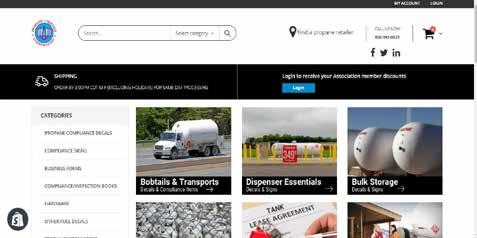
Lesson 10. Propane Use in the Home and Agribusiness - Show students the broad range of applications for propane at work and at home. • Lesson 11. Power Technology Applications of Propane Fuel - Teach students how propane fuels ag operations in a number of ways. • Lesson 12. Heat Applications of Propane in Agriculture - Take a closer look at the value of propane as a heat source in numerous ag applications. • Lesson 13. Pest Management and Sanitation Uses of Propane in Agriculture - Take a deeper dive into the ways propane is used to manage pests and sanitize ag operations.
Subscribe to the The Ag Post from PERC Great things are happening where propane and agriculture intersect. Get the latest news about propane in farm marketplace delivered directly to your inbox by subscribing to The Ag Post eNewsletter.
Sign up for the digital newsletter at https://propane.com/for-my-business/ agriculture/subscribe-to-the-ag-post/
VISIT PSC’s E-COMMERCE WEBSITE
Garrett Insurance Agency, Inc Formerly, Southern Star Insurance Agency, Inc Cecil Joiner, Risk Manager cecil@garrettinsurance.com 936-756-2222 www.garrettinsurance.com
WOULD YOU LIKE TO ADVERTISE IN TEXAS PROPANE MAGAZINE?
For Advertising, contact: Joanne Pantaze at 512-273-2639 or by email at jpantaze@pvco.net PetroStar Equipment Resources BOBTAILS FOR SALE
Purchase & Sale Pre-Owned Propane Tanks 5,000 gallons to 90,000 gallons
FOR SALE (2) 12,000 gallon, 250 psi, 2013 (2) 18,000 gallon, 250 psi, saddles, 2007
Contact: Jim Oliver 936-755-6108 petrostar@pdq.net
FOR SALE
1970 Arrow Tank – 2,600 Gallon with Blackmer Pump, LC Meter, Hannay Hose Reel w/125’ of 1” Hose. $5,000 Contact Chad 254-582-5359 Admin@dixielpgas.com

YOUR AD COULD BE HERE
Texas trucks, no rust, good to excellent condition: • 1998 Peterbilt, 6 speed, 2500 gal, tank, LC Register, Steel deck, Aluminum wheels, 45,386 miles on new motor in 2009 • 2003 Kenworth, 6 speed, 2800 gal. Whiteriver built tank, Neptune meter, steel deck, vapor reel, Guidemaster, Self-load plumbing, 17,248 miles on new motor in 2017. • 2005 Peterbilt, 6 speed, 2800 gal. tank, 300,000 miles. • 1964 Transport Trailer, 10,600 gal., Hydraulic pump, Rear load, Runs daily, Freshly repainted and Ready to go. Call or email for Pictures and Pricing @ 512-276-7800 or 1-800-696-3493 or sturner@directpropaneservices.com
FOR SALE
1984 Trinity Industries 30,000 gallon propane tank with steel saddles. Good paint. Located at Fort Worth. Contact – Ward Campbell 940-574-2521 wacampbell@haigood-campbell.com
CHERYL@LONGHORNPROPANE.COM or WENDY@LONGHORNPROPANE.COM, 830-964- 2525




MARCH 1 HVAC/Plumbing Training Contest Deadline
2 PERC Webinar Email Marketing www.candotraining.com
3-4 TPGA Board & Committee Meetings Lakeway, TX
3-6 The Work Truck Show 2020 Including the Green Truck Summit Indianapolis, IN
8-10 NPGA Spring TS&S Comm. Meeting San Antonio, TX
12-13 NPGA Spring Benchmarking Council Meeting Irving, TX
12-14 Hearth, Patio & Barbecue Expo New Orleans, LA
APRIL 6-8 Manufactured Housing Institute 2020 Congress & Expo Las Vegas, NV
6-8 NPGA Southeastern Convention & International Propane Expo Nashville, TN
9 PERC Council Meeting Nashville, TN
10 TPGA office closed for Good Friday
13 PERC webinar: Marketing to Recruit New Hires

Click LIKE on the Texas Propane Gas Association Page
19-22 GPA Midstream Convention New Orleans, LA
MAY 11-14 Advanced Clean Transportation (ACT) Expo Long Beach, CA
19-20 TPGA Board & Related Committee Meetings Waco, TX
25 TPGA office closed for Labor Day
JUNE 14-17 NPGA Presidential Forum, Annual Meeting & Propane Days Washington, D.C.
15-18 NFPA Conference & Expo Orlando, FL
Index to Advertisers
BLT Tanks 5 Cunningham Gas Products 23 Enterprise Products 31 Ferrellgas 17 Fisk Tank Carrier Inc. Outside Back Cover Gas Equipment Company 21 Genconnex Direct 31 Lone Star Energy Group 23 Longhorn Propane 28 Lumbermen’s Insurance Agency 12 Marshall Young Insurance 19 Meeder Equipment Co. 15 Metsa Tanks Inc. 20 MK Gas 13 Pinnacle Propane Inside Front Cover Propane Service Corporation 27 Quality Steel Corporation 17 Rural Computer Consultants 19 Westmor Industries 25 White River Distributors 16
Propane: Keeping Austin (City Limits) Fed
By Amber Thurlo Pearson

In Central Texas, after two months of relative quiet, March brings spring wildflowers and festival “season”. South by Southwest (which has now morphed into multiple “festivals”) is just the start of non-stop outdoor events that are often keen to use propane for outdoor cooking and heating devices.
The ACL (Austin City Limits) Music Festival, which started in 2002, feeds the souls of many Texans and people visiting from around the world, through music. Additionally, propane has a star role in feeding attendees’ bellies, in addition to artists in attendance.
Amerigas supplied the 4,800 gallons of propane that ACL used in 2019. This powered the kitchens for not only the array of local restaurants providing onsite dining options in the “Austin Eats” area, but also the backstage kitchens used to feed artists and crews. Attendance is roughly 450,000 annually. Artists at the 2019 Austin City Limits included Guns N’ Roses, The Cure, Lizzo and Kasey Musgraves, and over a hundred others.
“Propane was used in every aspect of the event that supplied food,” said Justine Staub, Director, Workforce Development. “We supplied propane to the main food court, mini food court, both VIP lounges, two general admission areas, the VIP tent for C3 Productions (event coordinators) and the catering tent for all crew and staff of the event,” she said.
Although ACL has used propane in the past, Amerigas has supplied the fuel to help, in part, the air quality at ACL for the first time this year.
Beyond greening efforts of ACL, such as recycling and refilling water bottles, the fest offsets 950 metric tons of carbon dioxide created by production emissions that have been calculated.

worked with the Austin Fire Department to collaborate on a safety plan for the event. In the past, the vendors would be required to transport their empty cylinders to a centralized depot to exchange them for full ones. To minimize handling of cylinders during the event, AmeriGas provided a larger 420# cylinder at each vendor so they could run off of one propane tank throughout. We filled the tanks between 5 a.m.-7 a.m. to limit exposure during the event. We also provided onsite technicians throughout Zilker Park to address any immediate questions or concerns during the event. We were able to set tanks, fill them and do any connections or maintenance before and after the event, which had a positive impact on the overall success and safety of the event,” she said.
Further, cooking with propane is being touted throughout the world as a safer alternative to cooking on open fires, which is often done in many developing countries. Not only is the burn and fire risk stronger, the particulate matter in cooking in an enclosed space is a known carcinogenic. Liquid propane gas can also remove sulphur oxides and nitrogen oxides from the air.
According to the World LPG Association’s Cooking for Life program, 4.3 million people die a year from indoor pollution attributed to solid fuels (such as wood) and kerosene. These cooking situations can cause respiratory illness that can lead to premature deaths. More than 1 million people a year die from Obstructive Respiratory Disease in settings such as cooking inside on more primitive stoves. Further, 70 percent of burns throughout the world are sustained cooking on open fires.
The World Health Organization echoes this, saying that indoor or household air pollution is the tenth leading cause of preventable death, and that it is the second most important cause of preventable disease behind waterborne contaminants.
CALLIESTEWART Marketing Representative o/713.381.4586 m/832.264.4775 CBStewart@eprod.com
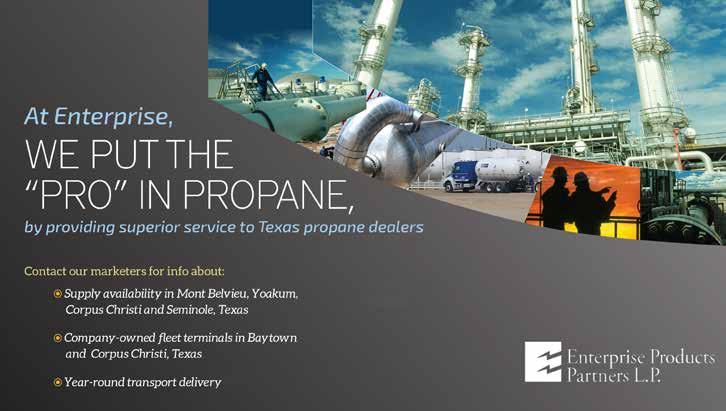


www.enterpriseproducts.com
Genconnex® Ultra-quiet, Ultra-reliable, long-lasting backup power Direct
Propane Honda Generators whisper-quiet & inverter-output professionally upgraded & EPA certified by Genconnex®
2.2kWatt EU2200i by Genconnex ®
3.2kWatt EU3000is by Genconnex ®
7kWatt EU7000is by Genconnex ®
7,000 Watts of Happiness! when the power goes out
52dBa ¼ load
The Honda EU7000is - whisper-quiet, propane & natural gas modified inverter output generator by Genconnex®
YES, this is ready to run for a very long time!
�skinc.net
